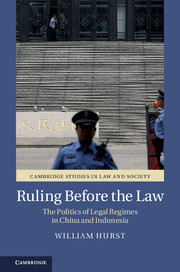Description
Ruling before the Law
The Politics of Legal Regimes in China and Indonesia
Cambridge Studies in Law and Society Series
Author: Hurst William
Building on extensive fieldwork in China and Indonesia, Hurst offers a valuable comparison of legal systems in practice.
Language: English
Subject for Ruling before the Law:
Approximative price 34.17 €
In Print (Delivery period: 14 days).
Add to cart
Ruling before the Law
Publication date: 01-2020
319 p. · 15x23 cm · Paperback
Publication date: 01-2020
319 p. · 15x23 cm · Paperback
Approximative price 91.54 €
In Print (Delivery period: 14 days).
Add to cart
Ruling before the Law
Publication date: 04-2018
316 p. · 15.7x23.5 cm · Hardback
Publication date: 04-2018
316 p. · 15.7x23.5 cm · Hardback
Description
/li>Contents
/li>Biography
/li>
How do legal systems actually operate outside of Western European or North American liberal democracies? To understand law and legal institutions globally, we must go beyond asking if countries comply with idealized, yet under-theorized, rule of law principles to determine how they work in practice. Examining legal regimes across different areas of criminal and civil law in both urban and rural China and Indonesia during distinct periods from 1949 to the present, William Hurst offers a new way of understanding how cases are adjudicated (and with what implications) across authoritarian, developing, post-colonial, and newly democratizing settings. This is the first systematic comparative study of the world's largest Communist and majority-Muslim nations, and the most comprehensive scholarly work in many years on the micro-level workings of either the Chinese or Indonesian legal system at the grassroots, based on a decade of research and extensive fieldwork in multiple Indonesian and Chinese provinces.
Introduction; 1. Understanding legal regimes; 2. Historical overview of Chinese and Indonesian legal regimes; 3. Law and revolution: mobilizational justice and charismatic politics; 4. Rule by law: authoritarian legitimacy and legal efficiency; 5. Neotraditional sclerosis: law in the service of stagnant hierarchies.
William Hurst is Associate Professor of Political Science at Northwestern University, Illinois. For this book, he completed more than two years of field research across rural and urban settings of multiple provinces in both Indonesia and China. His first book, The Chinese Worker after Socialism (Cambridge, 2009), explored the economic, social, and political causes and ramifications of more than 35 million job losses in China's state-owned enterprises, based on more than two years of fieldwork and over 350 interviews in nine Chinese cities.
© 2024 LAVOISIER S.A.S.



